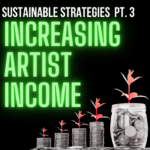From event coordination and marketing, to community management and performing, Jenn has glanced behind-the-curtain in many areas of this industry. Well-versed in all things Cyber PR, Jenn works with artists to identify if they’re a perfect fit for our company and if so, which services will be the best match. She will help them understand what their experience with us at Cyber PR will look like from day one, and her tell-it-like-it-is personality gives artists the first look of our company’s transparent nature. She is our PR Director, so she knows a thing or two about pitching strategies. Detail oriented (okay, more like detail-obsessed) and an avid networker she has a hand in writing our custom Total Tuneups and she works on our PR campaigns. Outside of the office you’ll find her at live music performances, drinking a glass of wine while daydreaming about her next travel adventure or snuggling with her long-hair orange tabby, Lil Ricky.
“Before you reach out to your first media contact, you’ll want to make sure you have some things in place to help make a strong first impression. When media professionals are inundated with hundreds of emails each day and only so much time to pay attention, you essentially have less than 30 seconds to make that impression count.” – Tunecore
This special segment of Instagram Live Q&As features two members of the Cyber PR team. Kayla Coughlan, Social Media Director, is joined by Jenn O’Hagan, PR Director, to talk all about pitching strategies for musicians. Well-versed in all things Cyber PR, Jenn has a vast knowledge of the music industry in multiple fields, and works with clients to launch their PR campaigns.
WATCH THE PITCHING STRATEGIES FOR MUSICIANS Q&A ON YOUTUBE!
To begin, the two discuss the different ways musicians are coping with quarantine and the covid-19 pandemic and how the changes it has brought on have impacted many of their careers and attitudes towards creating music.
What To Include In A Pitch
When finding the right outlets to pitch to, Jenn suggests looking at places where artists that are similar to you are pitching. It is also helpful to make sure these artists are at a similar tier than you, or a bit higher, so you have a better chance at landing your pitches. The same goes for when you are writing out your pitches. In a pitch, be sure to include your song title and release date, as well as who you sound like, so the people reading have an idea of what you sound like. It also helps to include where you’re from! Above all, you want to make sure that your pitch is thorough, but concise. As for when you should pitch, it depends on the publication. Some require at least a month of lead time before writing about you, so you should begin your research about two months prior to your release date to be safe.
Market Yourself
An important thing to remember with marketing, is that you are not only marketing your music, but yourself. One of the best ways to do that is by telling personal stories, or sharing the inspiration behind your songs. The more relatable you are, the stronger the connection will be that you build with the outlet you’re pitching to, as well as your fans.
Be Realistic
One thing to make sure you do as a new musician is to set realistic expectations. If you don’t have a large following just yet, don’t expect publications like Rolling Stone or Pitchfork to write about you. Start off small, and you will grow!
How To Follow Up
When it comes to following up on a pitch, Jenn says you want to space your messages out, and that after three strikes, it’s best to let it be. One week between messages is generally a good amount of time, unless there is other communication being had. Also, try to send your emails early on in the day! No one wants to receive an email at 8pm.
Use Soundcloud Or Spotify links
When you are pitching music, you will usually submit either a Soundcloud or Spotify link to your track. For blogs, they will almost always ask for Soundcloud because it’s the easiest to use. If you’re submitting to a playlist, Spotify is the way to go. Additionally, some outlets might ask for a Dropbox link. Sometimes, you can submit a music video in addition to your song. When doing that, you want to take a different approach because now you have to explain the meaning behind the visual component of this song, in addition to the lyrics.
Stay Positive!
There are many important things to keep in mind when pitching your music, and it can sometimes be scary. What’s important is to keep your head up, and use the tools available to you to create your best pitch. No one knows your music like you do! In this Live Q&A, Jenn and Kayla give you great tips to nail that perfect pitch, so definitely give it a watch!
In this video Kayla and Jenn discuss:
-
Common pitching strategies in the music industry
-
What to include in a pitch
-
When and how to follow up
-
What kind of links to use in your pitch












